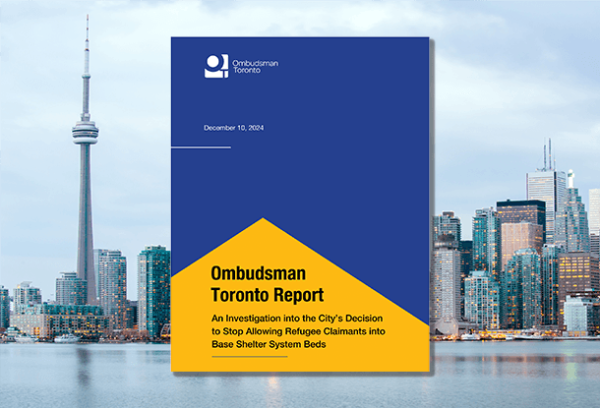On July 2023, refugees from Africa, newly arrived in Canada seeking asylum and protection, camped and slept on the sidewalk in front of the City of Toronto’s Shelter Referral Centre on Peter Street. The city’s shelter system had surpassed capacity and city staff had decided, already back in 2022, to exclude refugees from base shelter spaces even where beds were available.
City staff made this decision based on a lack of federal funding and a shelter system starved of the necessary resources. In response, African churches and community organizations stepped in to provide support and shelter where the city had failed.
On December 12, 2024, the Toronto Ombudsman released a report on the city’s decision and subsequent actions and found that the city had failed to meet its obligations under its own Toronto Housing Charter (and at the final council meeting of 2024, council opted to ignore it. Read Edward Keenan in the Star on that). The city made a policy choice to deny people a shelter bed based on citizenship, in violation of human rights legislation. The 122-page report includes 14 recommendations meant to guide the city in moving forward.
For the first time since the Office of the Ombudsman was created, the City Manager has refused to endorse the recommendations. In our view, this is a terrible mistake. We urge the Mayor and City Council to take a different course and accept the report and its recommendations.
In 2019, as part of its 10-year housing plan, the City of Toronto adopted its Housing Charter which recognized adequate housing as a fundamental human right, and its own role in progressively realizing the right to adequate housing. Progressive realization means that the city needs to set targets, measure progress, ensure non-discrimination, enable participation, act transparently and be accountable to these outcomes. This is not an aspiration. It is a set of responsibilities the city agreed to and for which it is accountable.
The city also committed to putting in place an accountability mechanism to ensure that it was on track and fulfilling its duty. To this end, the Deputy Ombudsman for Housing was established, and this report is the first systemic investigation it has completed.
By conducting independent investigations, an Ombudsman can uncover gaps in policy implementation, instances of mismanagement, or unintended consequences of municipal programs. Good governance requires transparency, particularly when dealing with a crisis as pervasive as homelessness. Too often, decision-making processes occur behind closed doors, leaving residents unaware of how funds are allocated or why certain policies are prioritized over others. This lack of transparency can erode public trust, especially when the outcomes fall short of expectations.
Addressing homelessness is not just a policy choice; there are legal obligations that the city has towards those who are homeless. Ombudsman investigations can identify instances where municipalities fall short of these mandates, providing a roadmap for corrective action.
For example, the Toronto Ombudsman’s 2018 investigation into the city’s winter shelter system revealed that many residents seeking shelter faced significant barriers, including inadequate information and lack of accessibility. Based on these findings, the Ombudsman made recommendations to improve the respite and drop-in system—all of which were accepted by the city. The report led to more transparent information and better supports for residents.
In the case of the Toronto Ombudsman’s recent report on shelter access for refugees, the recommendations support the city in moving forward on its human rights obligations and commitment to the right to housing. The city’s adoption of the recommendations will ensure that local policies and practices align with these commitments.
Beyond the practical benefits, there is a moral imperative to address homelessness in municipal governance. Toronto prides itself on being a compassionate and equitable society, yet the existence of widespread homelessness starkly contradicts these values. By acting upon the Ombudsman report, the city can signal its commitment to addressing its governmental obligations and demonstrate leadership, accountability, and compassion.
Dr. Alexandra Flynn is an Associate Professor at UBC’s Allard School of Law and Elizabeth McIsaac is President of Maytree.
This op-ed is cross-posted from the Maytree Foundation website.




